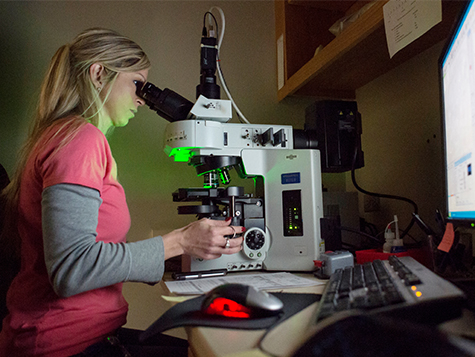 Four researchers at the University of Alabama at Birmingham School of Medicine have been funded by the Gilbert Family Foundation to explore developmental and potentially curative therapies to address the underlying genetic abnormalities of neurofibromatosis type 1, as part of the Gilbert Family Foundation’s Gene Therapy Initiative.
Four researchers at the University of Alabama at Birmingham School of Medicine have been funded by the Gilbert Family Foundation to explore developmental and potentially curative therapies to address the underlying genetic abnormalities of neurofibromatosis type 1, as part of the Gilbert Family Foundation’s Gene Therapy Initiative.
The goal of the initiative is to accelerate the development of curative therapies that address the underlying genetic abnormalities in NF1patients. Over the next three years, $12 million in research grants from the Gilbert Family Foundation will fund several renowned multidisciplinary research teams to identify which gene therapy techniques are most promising for NF1. Approximately half of that funding will be split between the four separate UAB research projects. The foundation utilized a rigorous and extensive process, including peer review, to identify top researchers and projects in each of the initiative’s gene therapy focus areas.
The UAB researchers are David Bedwell, Ph.D., professor and chair of the Department of Biochemistry and Molecular Genetics; Andre Leier, Ph.D., assistant professor; Deeann Wallis, Ph.D., associate professor; and Robert Kesterson, Ph.D., professor, all in the Department of Genetics and members of the UAB Neurofibromatosis Program directed by UAB chief genetics officer Bruce Korf, M.D., Ph.D. Other funded researchers from Duke University, Paris Descartes University and the University of Massachusetts are also part of the Gene Therapy Initiative.
The Gilbert Family Foundation believes that directly repairing, replacing or bypassing the NF1gene mutation is an important piece to curing NF.
“We are committed to funding revolutionary and big-idea research,” said Dan Gilbert, co-founder of the Gilbert Family Foundation. “The teams we have partnered with share this vision, and our family is honored to be working closely with this talented group of researchers and physicians.”
NF1 drug development has previously focused on addressing the symptoms caused by the disease. This important initiative takes an alternative approach by working to develop therapies that address the underlying genetic causes of NF1. This includes gene replacement, gene editing, RNA editing, exon skipping and nonsense mutation suppression.
“UAB is well suited to conduct this research, as our principal investigators are individually experts in the diverse fields that the Gilbert Family Foundation wishes to target,” said Korf, “yet we embrace a collaborative, team approach so that the projects are mutually supportive and will be able to call on additional expertise from throughout the neurofibromatosis program and across other disciplines on campus and at other universities.”
UAB’s Bedwell will study gene mutations that introduce a premature termination codon, or PTC into messenger RNA. PTCs can severely reduce the expression and function of neurofibromin, the NF1gene’s protein product. Bedwell’s lab has developed ways to detect compounds that can suppress termination of PTC’s through earlier work in cystic fibrosis. The project will examine whether this collection of new, validated, PTC suppression agents can restore full-length neurofibromin protein and its function in NF1 cell and animal models.
UAB’s Leier, along with Ulrich Müller from the University of California San Diego, will look at RNA repair based on therapeutic ribozymes. The project will bioengineer trans-acting RNA molecules with catalytic properties similar to protein enzymes, to target and repair faulty NF1 transcripts that otherwise fail to translate into functional neurofibromin. If successful, the proposed RNA repair therapy will be able to correct many different mutations in large regions of the NF1 transcript.
The project of UAB’s Wallis and Linda Popplewell, from Royal Holloway - University of London, will assess exon skipping strategies to restore at least partial neurofibromin activity in genetically engineered cell lines and animals that have been created to mimic NF1 patient-specific mutations. The team will use anti-sense oligos designed to specific NF1exons and evaluate their efficiency in inducing skipping as well as the resultant level of neurofibromin function in preclinical models.
UAB’s Kesterson and Jiangbing Zhou of Yale University will examine gene replacement and gene editing strategies to restore neurofibromin activity in genetically engineered animals that have been created to mimic NF1 patient-specific mutations. The team will use nanoparticles to deliver the reagents to the NF1 mutant mice to assess gene rescue, as well as studying new genetically engineered NF1 rats for cognitive deficits often found in NF1 patients.
NF1 causes tumors to form on nerves anywhere in the body, which can lead to disfigurement, blindness and cancer. NF1 can also result in learning disabilities, bone deformities and cardiovascular issues. The course of the disease is both unpredictable and variable among individuals.
